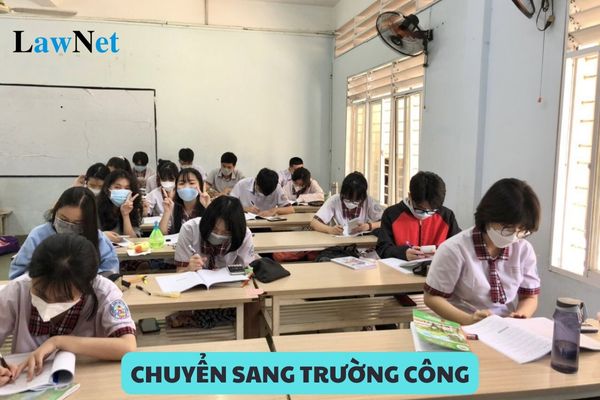What are conditions for private upper secondary school students to transfer to public schools in Vietnam?
Which upper secondary school students are considered for school transfer in Vietnam?
Based on Clause 1, Article 4 of the Regulation on School Transfer and Reception of Students Studying at Middle and upper secondary schools issued with Decision 51/2002/QD-BGDDT, the subjects eligible for school transfer and re-enrollment are stipulated as follows:
Subjects for School Transfer and Re-enrollment
- School Transfer:
a) Students transferring their residence along with their parents or guardians.
b) Students having particularly difficult family circumstances or compelling justifications for needing to transfer schools.
- Re-enrollment:
Students applying for re-enrollment after a period of absence but still within the age regulations for each education level.
Thus, upper secondary school students are considered for school transfer under the following circumstances:
- upper secondary school students transferring their residence along with their parents or guardians.
- upper secondary school students having particularly difficult family circumstances or compelling justifications for needing to transfer schools.

What are conditions for private upper secondary school students to transfer to public schools in Vietnam? (Image from the Internet)
Who has the authority to approve upper secondary school students' school transfers in Vietnam?
Based on Point b, Clause 2, Article 5 of the Regulation on School Transfer and Reception of Students Studying at Middle and upper secondary schools issued with Decision 51/2002/QD-BGDDT, the dossier and procedures for school transfer are stipulated as follows:
Dossier and Procedures for School Transfer
...
- Procedures for School Transfer:
...
b) For upper secondary school Students:
Intra-province, city transfers: The principal of the receiving school accepts the dossier and considers, resolves it according to the regulations of the Director of the Department of Education and Training.
Inter-provincial, city transfers: The Department of Education and Training of the receiving location accepts, reviews the dossier, and refers the student to a school.
Thus, the authority to approve upper secondary school students' school transfers is as follows:
- For intra-province, city transfers: The principal of the receiving school accepts the dossier and considers, resolves it.
- For inter-provincial, city transfers: The Department of Education and Training of the receiving location accepts, reviews the dossier, and refers the student to a school.
Note: School transfer is carried out at the end of the first semester of the school year or during the summer before the new school year's commencement. Exceptions regarding the timing are considered and decided by the Head of the Department of Education and Training (for middle schools) and the Director of the Department of Education and Training (for upper secondary schools) of the receiving location.
What are conditions for private upper secondary school students to transfer to public schools in Vietnam?
Based on Article 2 of the Regulation on School Transfer and Reception of Students Studying at Middle and upper secondary schools issued with Decision 51/2002/QD-BGDDT, as amended by Clause 2, Article 2 of Circular 50/2021/TT-BGDDT, the conditions for school transfer are stipulated as follows:
School Transfer
1. Except for the provisions in Clauses 2 and 3 of this Article, students are considered and approved for school transfer if they meet the requirements regarding subjects and transfer dossiers stipulated in Articles 4 and 5 of this Regulation.
2. The transfer from regular upper secondary schools to specialized upper secondary schools (ethnic boarding schools, specialized schools, gifted schools) is carried out according to the specific regulations of those specialized schools.
3. The transfer from private upper secondary schools to public upper secondary schools is only considered and approved in the following two cases:
a) Private upper secondary school students who need to transfer their residence along with their parents or guardians to economically and socially disadvantaged areas where there are no private upper secondary schools. In this case, the Director of the Department of Education and Training of the receiving location will consider and decide on each specific case regarding the transfer to public upper secondary schools.
b) Private upper secondary school students from schools with entrance examinations who need to transfer their residence with their parents or guardians to places where there are no private upper secondary schools of equivalent quality. In this case, the Director of the Department of Education and Training of the receiving location will consider and decide on each specific case regarding the transfer to public upper secondary schools.
Thus, the conditions for private upper secondary school students to transfer to public schools are as follows:
- For students transferring to economically and socially disadvantaged areas: Private upper secondary school students who need to transfer their residence to economically and socially disadvantaged areas where there are no private upper secondary schools. In this situation, the Director of the Department of Education and Training of the receiving location will consider and decide on the transfer to public upper secondary schools on a case-by-case basis.
- For students transferring to places without equivalent quality private upper secondary schools: Private upper secondary school students from schools with entrance examinations who need to transfer their residence to places without private upper secondary schools of equivalent quality. Here, the Director of the Department of Education and Training of the receiving location will consider and decide on the transfer to public upper secondary schools on a case-by-case basis.

